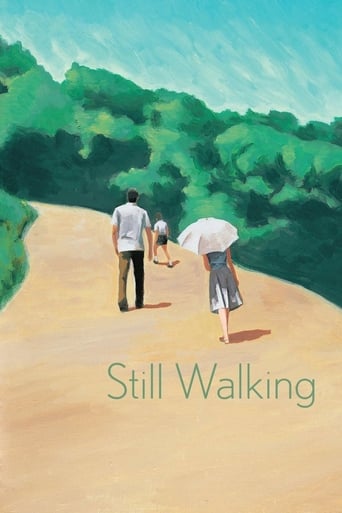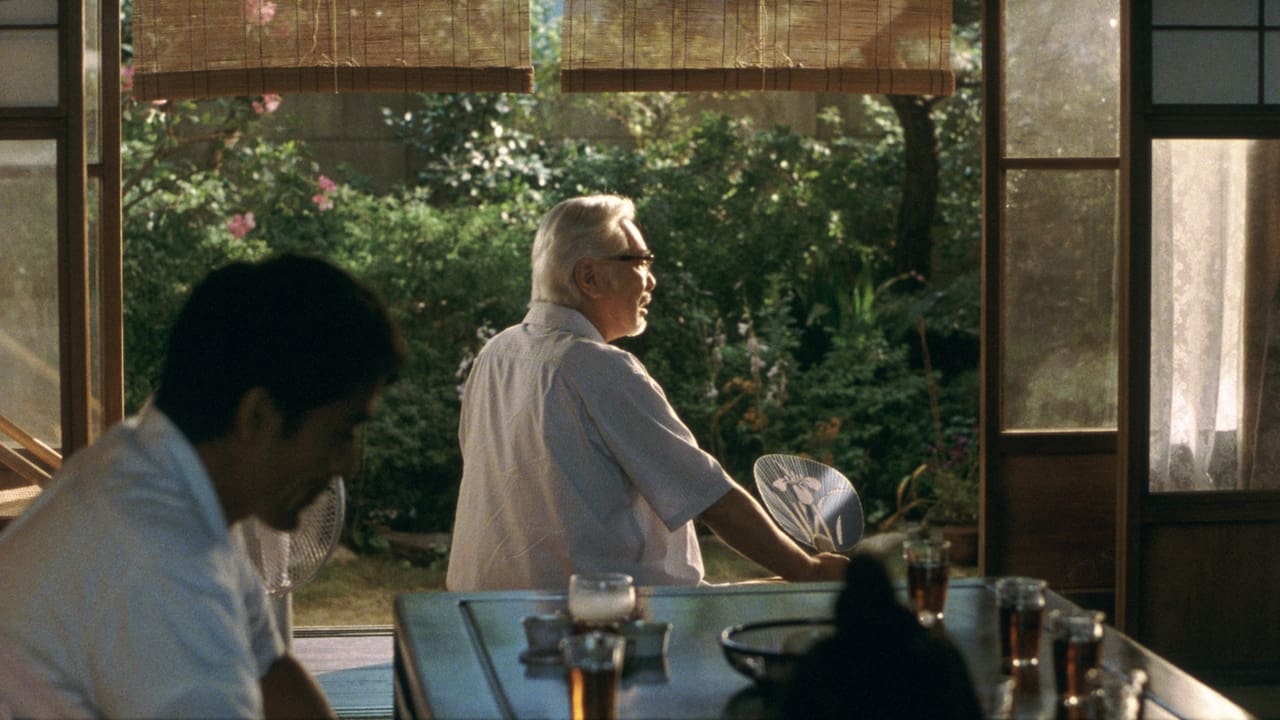oloanharahap
I never knew who was Hirokazu Koreeda before but after this film i salute him. The direction, the acting, and the unique feeling "Still Walking" give just amazing. Don't expect dramatic scene in this film. It's a meditation about life. The acting from Kiki Kirin just unbelievable, stunning, and very very natural. The film just a daily life experience yet it's touching like no other films does. Still Walking feels very close to a detail of family reunion and very touching. Authentic experience of family drama. What a great cinema experience. I will never forget this film in my life. 9 out 10.
Armand
a family reunion in memory of a person. a brother. a sister. theirs families. the parents. a prey-guest. feelings, dialogs, emotional walls. all in Japanese manner. all as circle of a rite. and traces of meeting. more than a movie, Aruitemo aruitemo is a picture. of family relationships., shadow of generations, values, gentle cruelty, generous gifts, images about the other, yellow butterflies, tombs and the words behind walk to home. it is, in same measure, a window. to the sense, common sense of existence. for the bricks of silence and wind of impressions. for colors of profound emotions who becomes cell for soul of an old doctor or for devoted wife. for a son who remains in very large measure stranger, for a daughter who create a future who change universe of her parents. like in case of tea, important in this case remains final taste. as heart of colors, sounds, impressions.
akkoziol
I very much enjoyed Nobody Knows (Dare Mo Shiranai) and After Life (Wonderful Life) immensely and found another good and engaging movie with Still Walking. Kore Eda seems to be in a small group of directors who use minimal music and other traditional movie elements in order to convey the story to the viewer. Just as talking in a low voice will elicit the heightened command of a listener, so too does Kore Eda use subtle dialogue and action to focus the viewers attention to what's going on.I can totally relate to the family in Still Walking because they come across as anyone's family. Literally. I felt as though I could have been watching my own family and not some Japanese family to whom I could not relate. All the elements are there from the big-city adult children coming to visit their small-town parents with their children en tow. The interplay between the fast pace of urban life and slow pace of rural life meet somewhere in the middle. Throughout, I felt as I usually do in a Kore Eda movie: a silent and invisible observer.The premise of the movie is that the family gathers together once a year on the anniversary of the death of the eldest son who we learn had drowned saving the life of another person who himself was attempting to commit suicide by drowning in the sea. As you may know, in Japanese society, if you save the life of someone who wishes to commit suicide, you effectively are responsible for their life going forward. In this case, the person doing the saving, the eldest son, had died in the process. So we see the person who he saved return year after year to be reminded in an indebted but somewhat cruel manner that he is alive and that he will be, for the rest of the parent's of deceased lives, be required to suffer the (cultural) humility of "being alive" while their son is dead.We also see the typical social dilemma of what to do as ones aging parents and additional interplay between the surviving son and his new, but widowed, wife and her child. We've seen the transaction a million times in other movies: mother in law has her comments and opinions, wife complains to the husband about her and her son's treatment, son has to either stand up to the parents or find some middle ground.All in all, it's well played out and I was very pleased by this film. It's an amalgam of growth, change, sacrifice, forgiveness, and the road we all have to travel as we get older or if we have children ourselves. Oddly though, the film's title doesn't make sense until near the end of the movie.
Chad Shiira
"Aruitemo aruitemo" is about ordinary Japanese people. Comparable to the 1980 Robert Redford-directed film starring Timothy Hutton, this Far East import also deals with a mom, and how she distributes her love among the children unequally, forcing the left behind son to compete against the dead one, the favored one, the first born. Fifteen years ago, Ryo's brother died in the ocean while trying to save another boy. With a wife and child among him, Ryota(Hiroshi Abe) has returned home for a reunion(to commemorate the fifteen-year anniversary of his sibling's untimely passing), where he faces not just a frosty mother, but a father who's the antithesis to the sire played by Donald Sutherland in the Redford film. Ryota brings home damaged goods; his wife and child are widow and stepson, and they rate far below their daughter's husband and two children, in spite of the Japanese people's partiality for boys over girls. Whereas Calvin Jarrett(Sutherland) loved his son unconditionally, Kyohei(Yoshio Harada) admonishes Ryota for not following in his footsteps by becoming a doctor. Although the surviving son is in the restoration business too, artwork can't begin to compete with the prestige of fixing people, thus the wedge was set between them years ago, and festers there still, throughout the duration of what will be his final visit back home. The mother(played by Kirin Kiri), who seems to be the more congenial parent, entertains Ryo's wife with her son's childhood things, and pulls out an old school essay, in which the boy had expressed an admiration for his father and the medical profession. But that fatal accident at the beach had brought out the truth in how the family worked, so Ryo turned to art history, probably to spite his father who loved him half as much as the first born. Sympathetic portrayals both, the widow and the stepson, nevertheless, they follow the pattern of reduced expectation, in which Ryo, had his brother lived on, would have married more prudently, and summoned a blushing bride for procreation. Told in retrospect, "Aruitemo aruitemo" takes place, perhaps, about ten years in the past, the amount of time it took Ryota to make peace with his parents, and love them unconditionally, once again."Your family isn't normal," says Toshiko to her son, on the return trip from a pilgrimage to the dead son's grave. She doesn't count Ryo's stepson as his real child. Such bluntness shocks, the cruelty of her words. Clearly, the tragedy had curdled her heart. At the outset, the mother makes corn "tempura" for her familial guests, especially the children, but on this same walking tour, the moviegoer learns that she can barely stand kids, and shudders at the thought of her daughter's filial plan of moving back home with her family. The filmmaker excels at showing how oblivious the young children are to the anger that bubbles beneath the surface of each family gathering. They don't see that the grown-ups are ready to implode. The mother's worst behavior, however, is reserved for the boy who survived, an overweight dropout with no career prospects whom the family invites every year, so that he remembers the sacrifice made on his behalf, a sacrifice in vain. The mother tells Ryota that he wants the boy to suffer just as she had suffered. The father calls him "trash". In "Ordinary People", the surviving brother(Hutton) was at the scene of the boating accident, and is made to feel by the mother(played by Mary Tyler Moore) that the wrong son lived on. In light of the parents' disapproval over his family life and occupation, it's easy to see how Ryo might feel that mom and dad are projecting on the hapless guest, their disappointment over himself being the only surviving male heir.When Ryota returns home, his parents are long-dead, but now he has a new addition, a daughter, who joins her parents and brother in honoring the grandparents she never met. As he pours water over their tombstone, the moviegoer speculates as to why Ryota finally made peace with his folks. Our eyes turn to the little girl, and we remember the old woman's words. The moviegoer wonders if he agrees with her. The dousing of the tombstones can be read as a son waking up his parents, in order for them see the grandchild they always wanted. Considering how Ryota's parents felt about the widow and stepson, it's somewhat perverse for them to participate in the ceremony. "Aruitemo aruitemo" is very, very Japanese. They're not like American people. They're not ordinary people.


 AD
AD




